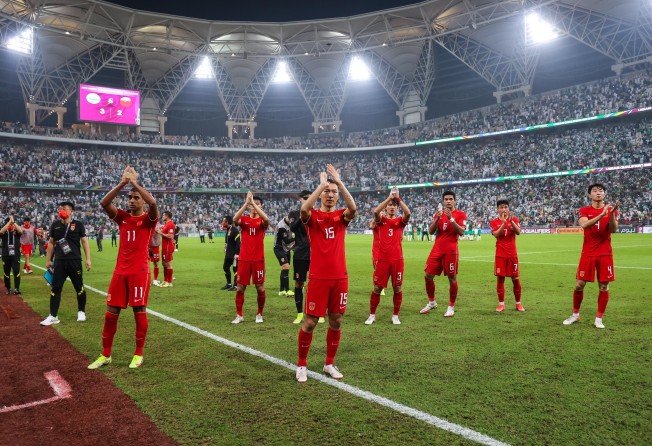For football’s sake: why China should host World Cup, even in face of defeat
- Readers discuss how hosting the tournament will help Chinese football, Hong Kong’s strengths as an insurance hub, and why tourists are not flocking back to the city

Feel strongly about these letters, or any other aspects of the news? Share your views by emailing us your Letter to the Editor at [email protected] or filling in this Google form. Submissions should not exceed 400 words, and must include your full name and address, plus a phone number for verification.
The Fifa World Cup in Qatar has drawn to a close. The majority of Hong Kong soccer fans have been happy to see Lionel Messi holding up the trophy for the winning team, Argentina, and drowning in ecstasy.
Earlier on, there was talk, including in the Western media, of China hosting the World Cup in 2030.
South Korea and Japan co-hosted the World Cup in 2002, and both nations did well in that tournament. Undeniably, both these soccer teams have since risen to a level that has raised quite a few eyebrows.
Meanwhile, the Chinese football team have not lived up to the expectations of many Chinese fans. Some even suspect China is not in the running to host the World Cup simply to avoid the embarrassment of the home team scoring zero goals.
If this face-saving decision has indeed been made by the Chinese soccer authorities, it is a big blunder. Don’t they have happy memories of the 2002 World Cup, with China having kicked their way to their first berth in the tournament and all Chinese people being sent into a frenzy? Commemorative stamps were even issued on the mainland and in Hong Kong and Macau.
In sum, the Chinese soccer authorities should picture and be motivated by the success and growth that will come of hosting the World Cup, instead of being frozen by fear of defeat and shame.
Randy Lee, Ma On Shan
Play to strengths in the insurance industry
Insurance is one of Hong Kong’s leading industries. Plenty of well-known and experienced international insurance and reinsurance corporations operate in Hong Kong, with risk management services covering not only the city, but also enterprises exploring overseas infrastructure and investment opportunities. Meanwhile, the Hong Kong government is fervently trying to consolidate the city’s status as an international insurance hub.
As an industry, insurance does not only matter to Hong Kong. Cities, like individuals, get tasks and roles assigned to them. If the task assigned is not something you’re good at, then you will spend a lot more time and energy ensuring you perform well. If the task happens to be what you’re good at, then you are lucky because it means you don’t have to start from scratch.
Similarly, if a task not only plays to a city’s strengths, but also meets the country’s development needs, then that is certainly the most ideal scenario for every party concerned.
This appears to be the case for Hong Kong, as far as the insurance industry is concerned. To align the city’s insurance regulatory framework with international standards, the government plans to set up a risk-based capital system to make capital requirements commensurate with the risks borne by insurance companies. Also, the government has introduced a series of measures to enhance the industry’s competitiveness.
There is little doubt the central government treasures Hong Kong’s strengths in the industry. It has been emphasised in the 14th five-year plan that Beijing will support Hong Kong to strengthen its position as an international risk management centre.
In fact, President Xi Jinping has reiterated that the trend of reform and opening up will continue. Also, the Belt and Road Initiative remains an important focus. As a result, more mainland enterprises are going international.
There is no better time than now for Hong Kong’s insurance corporations to provide a full range of services to mainland companies as they work on large-scale projects overseas. This is an opportune moment for Hong Kong’s insurance industry to shine.
Dr Kevin C.H. Lau, adviser, Our Hong Kong Foundation
Hong Kong still isn’t ‘normal’ enough for tourists
In your newspaper on December 15, the main article is headlined “Hong Kong vows to win back tourists with global push”, but there is also a summary which contains the words, “but the need to continue testing could prove an obstacle for visitors”.
I have a number of friends, living mainly in Western countries, who are subject to virtually no restrictions, but can decide themselves whether, for instance, to wear a mask in certain places or take a Covid test. These people have either lived in Hong Kong previously, visited pre-Covid, or have never been but have expressed a desire to do so. All, however, to my knowledge, are putting off their trips until there is no testing, no forced mask-wearing in the streets and, obviously, absolutely no restrictions on wining and dining.
We have no choice here because the authorities assume they know best for a populace well under their control. Those in Western countries have more freedom of choice and their choice is to wait and enjoy the freer conditions in their own countries or other tourist locations.
Hong Kong will only fully regain its deserved place as a popular tourist attraction when visitors are given the opportunity to choose, rather than being told to do things which they don’t think are necessary or which don’t add to their enjoyment as tourists.
Perhaps, if Mr John Lee Ka-chiu and his colleagues asked ordinary people for suggestions – especially regarding Covid restrictions – rather than their convenient cohort of “experts”, and really listened to them, instead of telling them what they must do on the basis of “scientific” advice, Hong Kong would quicken the return to real normality. Or is that too much to ask?
Chris Stubbs, Discovery Bay